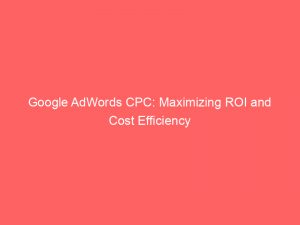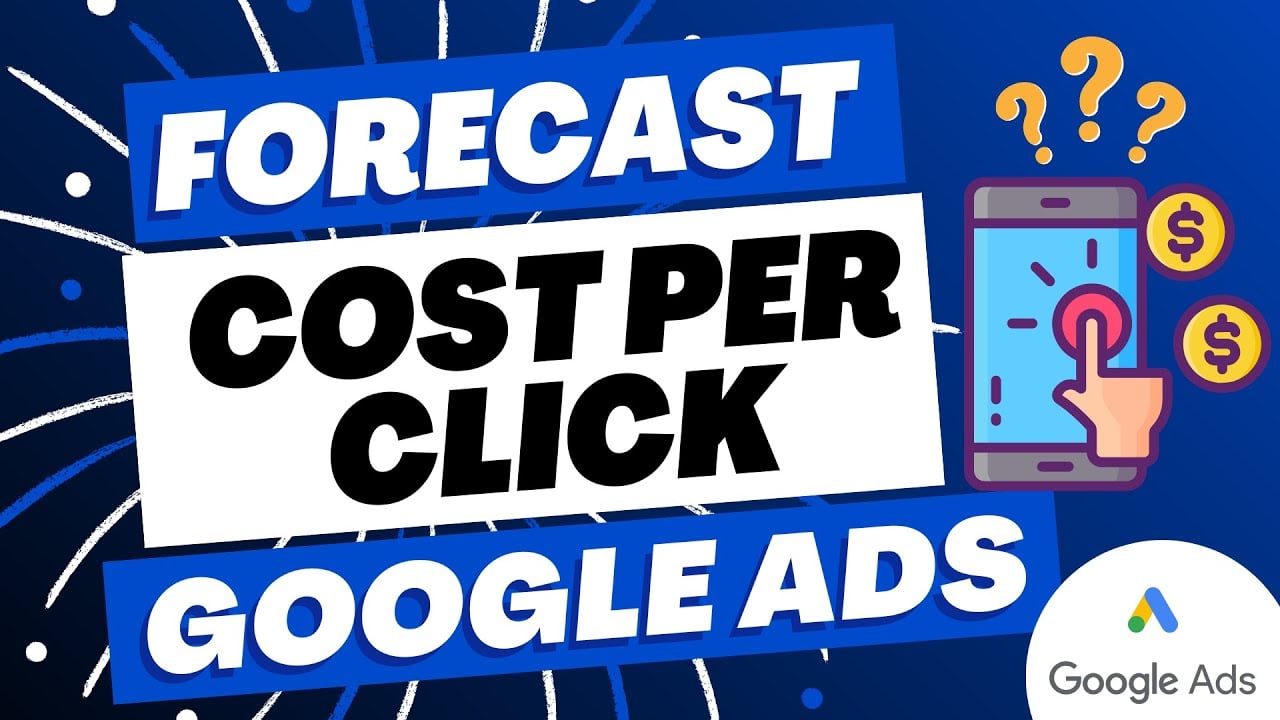- google adwords cpc
- Understanding CPC Bidding in Google AdWords
- Exploring Manual and Automatic Bidding Options
- Leveraging Enhanced Cost-Per-Click (eCPC) for Conversions
- Importance of Conversion Tracking for eCPC
- Utilizing Click and Conversion Patterns for Performance Improvement
- Setting CPC Targets for Manual Bidding
- Tailoring Bids with Factors like Browser, Location, and Time of Day
- Expanding eCPC to Mobile and Third-Party Bidding Systems
In the ever-evolving world of online advertising, one term that has gained immense popularity is Google AdWordsCPC bidding. Imagine a world where advertisers only pay for the clicks they receive on their ads, rather than for mere impressions.
Well, that’s exactly what CPC bidding offers. But here’s the best part – advertisers may end up paying even less than their maximum bid.
Intrigued? Read on to discover the fascinating world of CPC bidding and how it can revolutionize your advertising efforts.
From manual to automatic bidding options and advanced strategies like enhanced cost-per-click, we’ll explore how Google AdWords puts the power of conversions and cost control in your hands.
| Item | Details |
|---|---|
| Topic | Google AdWords CPC: Maximizing ROI and Cost Efficiency |
| Category | Marketing |
| Key takeaway | In the ever-evolving world of online advertising, one term that has gained immense popularity is Google AdWords CPC bidding. |
| Last updated | December 28, 2025 |
adwords-cpc">google adwords cpc
Google AdWords CPC stands for Cost-Per-Click bidding and it is a payment model where advertisers pay for each click on their ads. The actual CPC may be lower than the maximum CPC set by advertisers.
In Google AdWords, advertisers have the option to use manual bidding or automatic bidding. Enhanced Cost-Per-Click (ECPC) is available for various campaign types and adjusts manual bids for clicks that are more likely to lead to conversions.
Fresh tips added for advertisers this month.
To be effective, ECPC requires conversion tracking and utilizes click and conversion patterns to optimize performance and adjust bids. Advertisers using manual CPC bidding should adjust their CPC targets based on their average spend over 30 days.
ECPC takes into account various factors like browser, location, and time of day to tailor bids with the goal of increasing conversions while keeping the cost-per-conversion the same. It works with all campaign settings, max CPC bids, and even third-party bidding systems.
Furthermore, ECPC allows for mobile adjustments to bid more aggressively for specific types of traffic and automatically sets bid adjustments for differences in conversion rates between desktop and tablet traffic. Instructions for enabling ECPC in Google Ads are provided, along with a link for further reading.Key Points:
- Google AdWords CPC is a payment model where advertisers pay for each click on their ads.
- The actual CPC may be lower than the maximum CPC set by advertisers.
- Advertisers can use manual bidding or automatic bidding in Google AdWords.
- Enhanced Cost-Per-Click (ECPC) adjusts manual bids for clicks that are more likely to lead to conversions.
- ECPC requires conversion tracking and uses click and conversion patterns to optimize performance.
- ECPC takes into account factors like browser, location, and time of day to tailor bids and increase conversions.
Sources
https://support.google.com/google-ads/answer/116495?hl=en
https://support.google.com/google-ads/answer/2464964?hl=en
https://www.webfx.com/blog/marketing/much-cost-advertise-google-adwords/
https://www.searchenginejournal.com/data-whats-good-ctr-cpa-conversion-rate-adwords-2018/248947/
Check this out:
💡 Pro Tips:
1. Use Ad Schedule to optimize bidding: Google AdWords allows advertisers to adjust their bids based on the time of day and day of the week. Utilize this feature to ensure that bids are higher during peak times when your target audience is more likely to make a purchase.
2. Utilize bid adjustments for location targeting: If your business serves specific geographic areas, take advantage of location targeting and adjust your bids accordingly. Increase bids for areas where you have a higher chance of conversions and decrease bids for areas that are less likely to convert.
3. Optimize your landing page: A high-quality landing page is crucial for a successful Google AdWords campaign. Make sure your landing page is relevant to the ad, loads quickly, and provides a seamless user experience. This can help improve your ad’s Quality Score, which in turn can lower your CPC.
4. Regularly review and update your negative keyword list: Negative keywords are terms or phrases that you do not want your ads to show for. Continuously reviewing and updating your negative keyword list can help ensure that your ads aren’t triggered by irrelevant searches, leading to wasted clicks and higher CPCs.
5. Utilize ad extensions: Ad extensions provide additional information and options for users to interact with your ads. They can improve your ad’s visibility, increase click-through rates, and potentially lower your CPC. Experiment with different ad extensions, such as call extensions or sitelink extensions, to see which ones work best for your campaign.
Understanding CPC Bidding in Google AdWords
In Google AdWords, CPC bidding refers to the payment model where advertisers pay for each click on their ads. This means that advertisers are only charged when someone actually interacts with their ads by clicking on them.
This makes CPC bidding an effective and efficient way to ensure that advertisers are only paying for results.
However, it is important to note that the actual CPC (cost-per-click) that advertisers pay may be less than the maximum CPC set by them. This is because Google AdWords uses an auction-based system where advertisers are competing with each other in real-time for ad placements.
The final CPC is determined by factors such as the quality of the ad, the relevance of the landing page, and the ad rank.
Exploring Manual and Automatic Bidding Options
Google AdWords offers both manual bidding and automatic bidding options for advertisers. Manual bidding allows advertisers to have full control over their bids and set maximum CPCs for their ads.
This gives them the ability to adjust their bids based on their specific goals and budget.
On the other hand, automatic bidding allows Google AdWords to dynamically set bids based on various factors such as the likelihood of a click leading to a conversion. This option is ideal for advertisers who want to take a more hands-off approach and let the system optimize bids for them.
Leveraging Enhanced Cost-Per-Click (eCPC) for Conversions
Enhanced Cost-Per-Click (eCPC) is a bidding strategy offered by Google AdWords that adjusts manual bids to increase conversions. It analyzes patterns of clicks and conversions to identify which clicks are more likely to result in a conversion.
By increasing bids for these clicks, eCPC aims to maximize conversions while keeping the cost-per-conversion the same.
It is important to note that eCPC is available for various campaign types, such as Search, Display, Hotel, and Shopping campaigns. However, to effectively utilize eCPC, conversion tracking is necessary.
Conversion tracking allows advertisers to track the actions that users take after clicking on their ads and provides valuable data for optimizing bids.
Importance of Conversion Tracking for eCPC
Conversion tracking is crucial for the effective implementation of eCPC in Google AdWords. It allows advertisers to measure the results of their ad campaigns by tracking the actions that users take on their website after clicking on an ad.
This data is essential for understanding which clicks are resulting in valuable conversions and optimizing bids accordingly.
By having conversion tracking in place, advertisers can gain valuable insights into the performance of their ads and make data-driven decisions to optimize their campaigns. The data collected through conversion tracking is used by eCPC to adjust bids and improve performance.
Utilizing Click and Conversion Patterns for Performance Improvement
eCPC utilizes patterns of clicks and conversions to improve performance and adjust bids accordingly. By analyzing data from previous campaigns, eCPC can identify trends and patterns in terms of which clicks are more likely to lead to conversions.
This information allows eCPC to optimize bids and increase the chances of driving valuable conversions for advertisers.
The use of click and conversion patterns also enables eCPC to learn and adapt over time. As more data is collected, eCPC becomes more accurate in predicting which clicks are most likely to result in conversions, leading to improved performance and cost efficiency.
Setting CPC Targets for Manual Bidding
For advertisers using manual CPC bidding, it is important to set realistic CPC targets based on their average spend over a 30-day period. This ensures that advertisers have a clear understanding of their budget and are not overspending on individual clicks.
Setting CPC targets helps advertisers maintain control over their ad spend and ensures that they are optimizing their budget for maximum ROI. By setting targets based on their historical data, advertisers can align their bidding strategy with their overall advertising goals.
Tailoring Bids with Factors like Browser, Location, and Time of Day
eCPC takes into account various factors such as browser, location, and time of day to tailor bids and maximize performance. By analyzing these factors, eCPC can determine the value of a click and adjust bids accordingly to increase the chances of conversion.
For example, if data shows that certain browsers or locations have a higher conversion rate, eCPC will prioritize bids for those specific segments to maximize conversions. This level of customization allows advertisers to target their audience more effectively and improve the overall performance of their ad campaigns.
Expanding eCPC to Mobile and Third-Party Bidding Systems
eCPC is not limited to just the Search Network and Display Network in Google AdWords. It can also be applied to mobile campaigns, allowing advertisers to bid more aggressively for specific types of traffic on mobile devices.
This flexibility ensures that advertisers can optimize their bids for different platforms and devices to maximize conversions.
Furthermore, eCPC also works seamlessly with third-party bidding systems. Advertisers can leverage the benefits of eCPC while using external bidding tools to manage their campaigns.
This allows for greater flexibility and control in optimizing bids and driving conversions.
In conclusion, Google AdWords CPC bidding offers advertisers a cost-effective way to drive traffic and conversions. With options for manual and automatic bidding, as well as the utilization of eCPC, advertisers can maximize their ROI and cost efficiency.
By implementing conversion tracking and leveraging click and conversion patterns, advertisers can optimize their ad campaigns and tailor their bids based on factors like browser, location, and time of day. With the ability to expand eCPC to mobile and integrate with third-party bidding systems, advertisers have the tools they need to achieve their advertising goals successfully.
Native Ad Network • Advertising Platform for Marketers • Programmatic Advertising • Performance Marketing Tips • Buy Traffic











